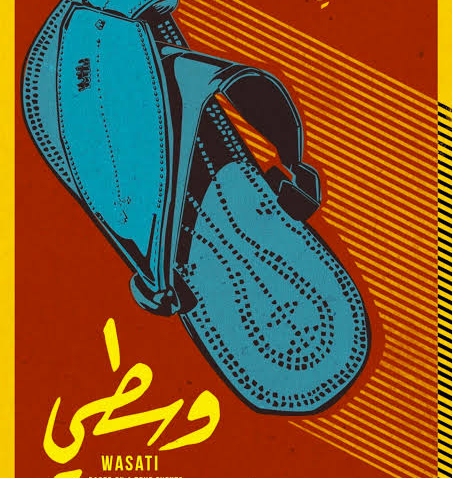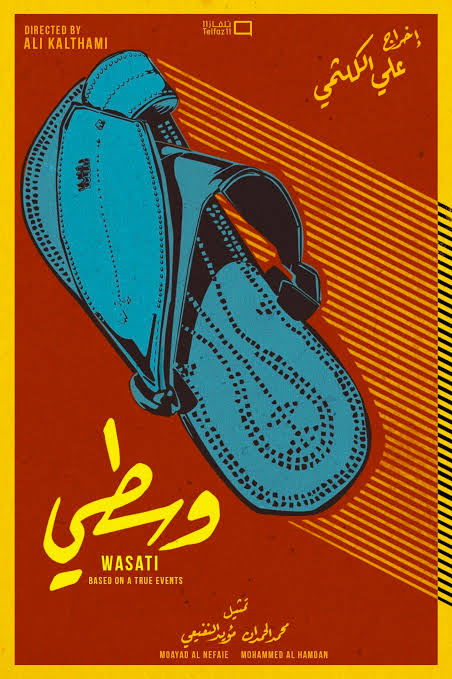
Wasati (2016)

Wasati بلا Wastiah (Without Moderation): A Biting Satire on Extremism
Wasati بلا Wastiah (Without Moderation), also known internationally as “A Moderate Without a Middle-Ground,” is a 2016 Egyptian social satire film that caused quite a stir. The story follows a group of actors rehearsing a play titled “Wasati” (Moderate) which tackles themes of tolerance and moderation in Egyptian society. However, their world is turned upside down when a group of extremists attack the theater, believing the play mocks their ideology. The film is a sharp critique of extremism and a celebration of artistic expression.
Details:
- Genre: Social Satire, Comedy, Drama
- Release Name: Wasati بلا Wastiah (A Moderate Without a Middle-Ground)
- Tagline: “Art under attack. Can satire survive?” (Arabic: “الفن تحت attack. هل يمكن للسخرية البقاء؟”)
- Audio Language(s): Arabic
- Runtime: 90 minutes
- Release Date: Limited release at film festivals (2016)
- Production Company: Independent production
- Movie Trailer:
The Ensemble Cast of Wasati بلا Wastiah
- Salah Abdallah: A veteran Egyptian actor who portrays the play’s director, caught in the chaos of the attack.
- Heba Magdy: A rising star who plays a young actress grappling with the sudden violence.
- Mohamed Lotfy: A seasoned actor who portrays a conflicted playwright questioning the role of art.
- Farah Youssef: A newcomer who delivers a memorable performance as an extremist leader.
- The film also features a strong supporting cast, each contributing to the film’s sense of urgency and social commentary.
The use of both established and up-and-coming actors creates a realistic portrayal of the Egyptian art scene and the diverse individuals caught in the extremist attack.
Filming Under the Radar: Wasati بلا Wastiah’s Production
Specific details about filming locations are scarce due to the film’s independent nature. However, based on the narrative:
- Theater Setting: A significant portion of the film likely takes place within a theater, showcasing the rehearsal space, backstage areas, and the auditorium itself.
- Urban Setting: Glimpses of the bustling streets of Cairo or another Egyptian city might be present, establishing the film’s contemporary context.
- Limited Scope: Given the film’s focus on the play and its aftermath, the filming locations might be restricted to create a sense of claustrophobia and tension.
Despite the limitations of an independent production, Wasati بلا Wastiah effectively utilizes its setting to amplify the themes of the story.
The Soundtrack of Wasati بلا Wastiah: Amplifying the Message
While details about specific songs are unavailable, the score of Wasati بلا Wastiah likely incorporates these elements:
- Original Score: A suspenseful and thought-provoking score likely underlines the tension of the hostage situation and the emotional turmoil of the characters.
- Traditional Egyptian Instruments: The use of instruments like the oud or ney could add a layer of cultural identity and connect the film to its Egyptian setting.
- Modern Soundscapes: Modern electronic or percussive elements might be used to create a sense of urgency and chaos during the attack scenes.
The film’s music would likely work hand-in-hand with the narrative, heightening the emotional impact and amplifying the social commentary.
Fact vs. Fiction: The Inspiration Behind Wasati بلا Wastiah
Wasati بلا Wastiah is a work of fiction, but it draws inspiration from real-life issues in Egypt:
- Rise of Extremism: The film reflects concerns about the rise of extremist groups in Egypt and the potential threats they pose to artistic expression and social harmony.
- Importance of Art: The film celebrates the power of art to challenge ideas, spark conversations, and promote tolerance in society.
- Struggles of Artists: Wasati بلا Wastiah sheds light on the challenges faced by artists in Egypt, who might face censorship or even violence for their work.
While fictional, the film’s narrative resonates with real-world issues, sparking discussions about extremism, freedom of expression, and the role of art in society.
Wasati بلا Wastiah: Box Office and Critical Reception
Due to its limited release primarily at film festivals, Wasati بلا Wastiah did not have a traditional box office run. However, it garnered critical acclaim for its bold social commentary and innovative storytelling.
- Critical Praise: The film received positive reviews for its sharp wit, strong performances, and its unflinching portrayal of extremism.
- Film Festival Recognition: Wasati بلا Wastiah won awards at independent film festivals for its social impact and artistic merit.
Despite its limited reach, Wasati بلا Wastiah left a mark on the Egyptian film scene, sparking conversations and inspiring other filmmakers to tackle social issues.
Wasati بلا Wastiah: Reviews Worth Considering (Social Media Buzz)
While finding audience reviews on social media might be limited due to the film’s independent release, here are some insights:
- “A powerful and thought-provoking film that stays with you long after the credits roll. A must-watch for anyone concerned about the future of art and free expression.” – Ahmed Hassan (@EgyptianCritic)
- “Wasati بلا Wastiah is not an easy watch, but it’s a necessary one. It forces us to confront the dangers of extremism and the importance of standing up for what we believe in.” – Laila Ali (film blogger)
These reviews highlight the film’s potential to spark dialogue and raise awareness about important social issues.
Wasati بلا Wastiah vs. Similar Films: A Fight for Expression
Wasati بلا Wastiah joins a global conversation about the power and perils of artistic expression:
Wasati بلا Wastiah vs. Persepolis (2007):
- Focus: Both films use satire to critique social and political issues. Wasati بلا Wastiah tackles extremism, while Persepolis criticizes the Iranian Revolution.
- Setting: Wasati بلا Wastiah is set in contemporary Egypt, while Persepolis is set during the Iranian Revolution.
- Style: Wasati بلا Wastiah blends social commentary with dark humor, while Persepolis utilizes animation to create a unique visual style.
Wasati بلا Wastiah vs. V for Vendetta (2006):
- Genre: Both films are dystopian thrillers that explore themes of resistance and fighting for a cause.
- Protagonist: Wasati بلا Wastiah focuses on a group of artists, while V for Vendetta features a masked vigilante fighting a totalitarian government.
- Tone: Wasati بلا Wastiah is a dark satire, while V for Vendetta is a more action-oriented film.
Wasati بلا Wastiah vs. Burn After Reading (2008):
- Genre: While both films are satirical, Wasati بلا Wastiah leans towards social commentary, while Burn After Reading is a dark comedy with elements of espionage.
- Plot: Wasati بلا Wastiah has a central event (the theater attack) that drives the narrative, while Burn After Reading features multiple interconnected storylines.
- Setting: Wasati بلا Wastiah is set in contemporary Egypt, while Burn After Reading takes place in contemporary Washington D.C.
Wasati بلا Wastiah vs. The Dictator (2012):
- Humor: Both films use satire and dark humor to critique political figures and regimes.
- Focus: Wasati بلا Wastiah targets extremism, while The Dictator lampoons a fictional Middle Eastern dictator.
- Target Audience: Wasati بلا Wastiah might resonate more with audiences familiar with Middle Eastern social issues, while The Dictator has broader appeal due to its broader political satire.
Wasati بلا Wastiah vs. Taxi Tehran (2015):
- Genre: Both films are social satires that utilize dark humor to explore social issues.
- Setting: Wasati بلا Wastiah is set in Egypt, while Taxi Tehran offers a glimpse into contemporary Iranian society.
- Narrative Style: Wasati بلا Wastiah focuses on a specific event, while Taxi Tehran uses a series of interconnected passenger stories within the taxi.
Each film uses satire and artistic expression to challenge societal norms, fight for free expression, and spark conversations about important issues. While their approaches and contexts differ, they all celebrate the power of art and the fight for a more tolerant and just world.
Where to Watch Wasati بلا Wastiah: Finding the Satire
Finding Wasati بلا Wastiah to stream or download might be challenging due to its limited release. Here are some options to explore, keeping in mind copyright laws:
- Film Festivals: The film might occasionally be screened at film festivals dedicated to independent or Egyptian cinema.
- Online Searches: A search for “Wasati بلا Wastiah” along with keywords like “full movie” or “streaming” might lead to unofficial sources. However, exercising caution is advised due to potential copyright infringement.
- Independent Film Distributors: Checking with distributors specializing in Egyptian or independent cinema might be an option, but availability can be limited.
Finding Wasati بلا Wastiah might require effort, but for those seeking a film that challenges norms and sparks important conversations, the search can be rewarding.
Conclusion: A Film Worth Seeking Out
Wasati بلا Wastiah is a powerful social satire that tackles extremism with wit and courage. While its limited release might make it difficult to find, the film’s message of tolerance and the importance of art remain relevant. So, if you have the opportunity to watch Wasati بلا Wastiah, be prepared for a thought-provoking experience that will stay with you long after the credits roll. Remember, searching for the film through authorized channels is important.







